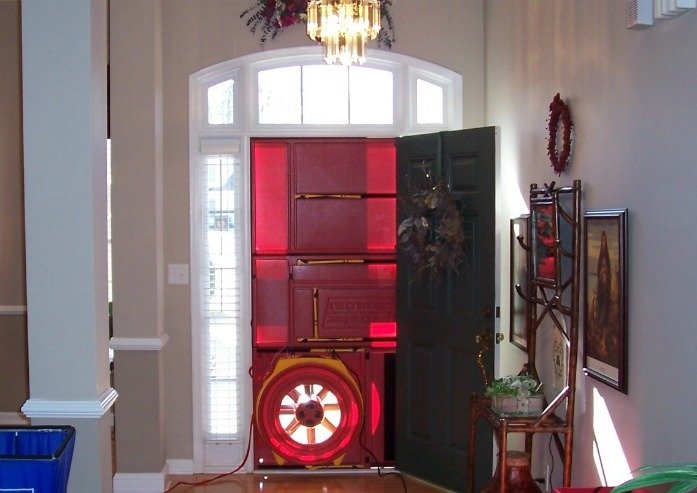No products in the cart.
Top Considerations if You Want to Start a Blower Door Testing Business
Many of the HVAC contractors and insulation professionals who are interested in blower door training intend to learn new skills so that they can start a business and reach new customers. In this case, a blower door testing business helps contractors branch out from their specialty trade and use their newly earned blower door testing certification to work directly with builders on energy code compliance.
We have this same conversation by phone with contractors multiple times a day, every day, so I thought I’d share some snippets from a recent call and answer the commonly asked questions about starting a blower door testing business.
 This particular conversation was between our BPI/RESNET Program Manager Sean Gray and a prospective student with a background in insulation. Prior to working for Everblue, Sean worked for a utility company and led a team of BPI Building Analysts providing residential energy assessments. Sean understands our students’ motivations and concerns because he’s been there himself. In this conversation, he shares some anecdotes from his experiences as a blower door testing contractor.
This particular conversation was between our BPI/RESNET Program Manager Sean Gray and a prospective student with a background in insulation. Prior to working for Everblue, Sean worked for a utility company and led a team of BPI Building Analysts providing residential energy assessments. Sean understands our students’ motivations and concerns because he’s been there himself. In this conversation, he shares some anecdotes from his experiences as a blower door testing contractor.
Without further ado, here are the top questions people interested in starting a blower door testing business typically ask:
How much could I charge for a blower door test?
It depends. It depends on the company, your location, what types of houses you’re working on, etc. When Sean was working on the coast of North Carolina, he and his team were offering very simple blower door tests and would charge $200 per house. If they had a larger house, say 2,500 square feet, they might charge $225.
If your goal is to work directly with builders on new construction homes to meet energy code requirements, it’s possible to book, per builder, 20+ houses a year and charge $300-$400 per house. The real goal here is to grow and scale by establishing relationships with multiple builders. Imagine if you had multiple builder partnerships, and each builder had 20+ houses that year. Moreover, if you had a partnership with one builder that did 100 houses a year, that averages to 8.3 houses per month; let’s say you charge $300 per house, that’s $2,500 earned in a month from that one builder.
He’s also heard of other companies and other scenarios where the teams have charged as much as $450 per blower door test.
How many appointments could I reasonably take in a day?
Once you’ve got established builder partnerships and are more comfortable working in the industry, it’s possible to take 5-6 appointments in one day.
If you’re doing the math here… $200 per house with 5 appointments in a day, it’s possible to make $1000 in one day. Not every day will look like that, and it depends on your personal work style.
Sean and his team had their work down to a science; they were familiar with the house plans offered by their builder partner so they already knew the square footage of the home and exactly what to expect in terms of air changes per hour. They got into a rhythm and felt confident doing their blower door tests in an efficient way.
How much is blower door equipment?
In its simplest form, the blower door itself is going to be about $3,500. If you buy a duct blaster, that’s going to be about $2,500.
From there, you could decide to go all out and spend another $1,000 on other types of diagnostic energy auditing equipment, but it really depends on the scope of your business.
There is a direct correlation between the equipment you need and the type of blower door testing business you intend to have. If you’re working with builders on new construction homes and code compliance, you could start with just your blower door testing business. That means you can earn the BPI Infiltration & Duct Leakage certification, purchase a blower door set, and rock-and-roll.
As you progress, if you start doing more diagnostic testing, combustion safety testing, and workscope development on existing homes, you might choose to upgrade to a whole-house energy auditor, or BPI Building Analyst. In that case, you would want to purchase additional equipment, such as an ambient CO monitor, combustion analyzer, pressure pan, and fan flow meter.
Which BPI Certification should I pursue to become a business owner?
As we said in the previous section, the answer to this question depends on what type of blower door testing business you want to start.
 The BPI Infiltration & Duct Leakage course is entry-level and will teach you how to physically set up, operate, and perform blower door and duct leakage tests. You will not spend a lot of time learning about building science principles or understanding exactly what the results of the blower door test mean in terms of the greater picture of the house’s energy efficiency. You’ll just be a third party technician helping out a builder who needs a blower door test and needs to hit a certain number to meet energy code requirements. There’s nothing wrong with this pathway; it certainly meets a need in the industry. Your niche would be knocking out large volumes of houses for builders and not necessarily understanding why a blower door test failed on a specific house.
The BPI Infiltration & Duct Leakage course is entry-level and will teach you how to physically set up, operate, and perform blower door and duct leakage tests. You will not spend a lot of time learning about building science principles or understanding exactly what the results of the blower door test mean in terms of the greater picture of the house’s energy efficiency. You’ll just be a third party technician helping out a builder who needs a blower door test and needs to hit a certain number to meet energy code requirements. There’s nothing wrong with this pathway; it certainly meets a need in the industry. Your niche would be knocking out large volumes of houses for builders and not necessarily understanding why a blower door test failed on a specific house.
If you want to be able to speak more intelligently about the blower door test results, and offer additional diagnoses throughout the house, then you’ll need to understand building science principles like heat radiation and R-values to make appropriate recommendations for improvement. That’s where BPI Building Analyst comes into play. Specifically, when looking at the difference between the BPI IDL course and the BPI Building Analyst course, you’ll see that the BPI Building Analyst course contains almost twice as much “classroom” content – and that’s the building science.
What are the BPI training formats offered by Everblue?
We offer our BPI Certification packages in two formats:
- 100% Online – starts with online (self-paced) video modules. Candidates can access the training immediately after registration and will be able to follow along any time 24/7 for 6 months. When you’re ready to take the exam, you’ll simply schedule a day and time to be remotely proctored.
- Blended – starts with the same online (self-paced) video modules described above. The biggest difference between the two formats is that you will join us for one day in person to get hands-on experience using the energy auditing equipment that we’ve provided. You’ll also take your certification exam(s) in person in a proctored testing environment at our course location.
How does the remotely proctored BPI exam work?
With the 100% online format of the course, you’ll schedule a day and time to be remotely proctored for your certification exam, meaning that you’ll record yourself in real time on a mobile phone or webcam and stream the video to us. You will need to buy, borrow, or rent equipment and secure a house that meets the BPI standards.
If you’re ready to get started, visit our BPI Training Catalog. If you have additional questions, speak with Sean directly when you call (800) 460-2575.

Image credit: Holtkamp Heating & A/C, Inc.